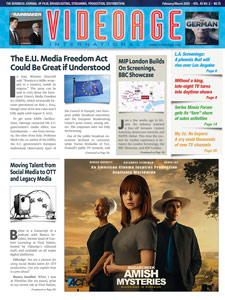The editorial task at hand was rather challenging for a TV trade publication. We were to determine whether the U.S. studios’ international content sales divisions tend to assume the personalities of their presidents. The obvious answer is a resounding yes, but the questions that remain are: Why and how?
“This is a subject for The Harvard Business Review,” said Tony Friscia, a former executive at several Hollywood studios, when asked for a comment. And even though the topic might seem retro, it is indeed current, as the monthly business magazine Fast Company reported in July that “65 percent of employees in America say they would rather change their boss than have a pay raise, and that 75 percent of people quit their jobs because of their direct line manager, making bad leadership the number one cause of voluntary turnover in the world.” In addition, the publication stated, “meta-analytic studies show that people quit bosses, not jobs. Toxic supervisors have a bigger impact on turnover than salary.”
Sure, the differences in personalities are, to a certain degree, dictated by the corporate environments, ownership changes, the business and technological climate of the moment, and the volume of the international business: from the $500 million a year for each studio in the ‘80s to the $3 billion of recent years, which surpassed domestic syndication revenues. But they are also shaped by the individual international TV executives, who tend to surround themselves with trusted associates with compatible personalities.
For example, at Warner Bros. TV International, Jeff Schlesinger, who was considered a super salesman, but not thought to be a “people person,” ran his division differently than his predecessor, Michael J. Solomon, who passed him the baton in 1995. And Schlesinger’s equally talented associates tended to match his personality. Solomon, meanwhile, defined his own managerial style as “demanding, but in a way that I got the most productivity from everyone in my division, while at the same time we established a family atmosphere.” For his part, Schlesinger said that he “will pass on providing a comment.”
One Acquisitions director at a northern European broadcaster, who didn’t want his name to be used, said: “Certainly, the personalities of the likes of Jeff Schlesinger and [Fox’s] Mark Kaner did influence the way their teams sold their catalogs. Other studios like Disney had a more corporate style, which came from the top.”
Indeed, according to Ben Pyne, who ran Disney’s Global Distribution division from 2007 until 2017, there was a committee that ran Disney’s EMEA team from 2005 until 2009.
Looking back, it’s clear that Bruce Gordon had a unique way of running Paramount TV International, and it was different from his successors: Gary Marenzi, Armando Nuñez, and current head honcho Dan Cohen.
Marenzi described his management style at both MGM and Paramount as “collegial, collaborative, and progressive. Every success we had can be attributed to the teamwork and innovative deal-making that came out of our collaborative staff environment.”
Nuñez, who started at CBS in 1999, would not describe his management style, stating that it should instead be a task for his former colleagues.
Naturally, the division’s personality would also depend on who the division head would be reporting to. In the case of Paramount, there were differences in how people acted when different people were in charge. Things were different when it was headed by Barry Diller (1974-1984) than they were when Jonathan Dolgen (1994-2004) was in charge. And they were again different when Les Moonves (2004-2006) took the reins. (Moonves continued as CEO of CBS Corp. until 2018.)
Some problems would replicate when top brass moved from studio to studio and found their former underlings there, like in the case of Diller, who went from Paramount to Fox (1984-1992) to Universal Television (1997-2001), and Michael Eisner, who went from Paramount (1976-1984) to Disney (1984-2005). One could only imagine the resilience of studio executives like Len Grossi who worked under the same bosses for almost his entire studio career, starting at Paramount, moving to 20th Century Fox, moving back to Paramount, and then to Columbia TriStar TV.
At MCA TV International (known today as Universal Distribution), Colin Davis, a former banker, imprinted his own brand that was different from that of his predecessor, Bob Bramson, a former FBI agent, who took over from Ralph Franklin, a boss who created what many former executives considered a “toxic environment.” Bramson instituted a carefree atmosphere, while Davis gave MCA International TV a more collegial nature.
The late Davis once told VideoAge that “working under Franklin was very difficult,” but wouldn’t elaborate. For his part, Franklin contended that his attitude reflected that of his own tough bosses.
Years ago, in an interview with VideoAge, Roger Cordjohn, who started in Sales at MCA TV in 1964, and was first stationed in London and later in Paris, recalled: “Colin’s management style was visionary, inspirational, and rewarding… and let’s not forget his unique sense of humor.”
One executive who worked for both Bramson and Davis but wished to remain anonymous, said that Bramson was “respectful, cautious, conservative, detail-oriented as befit a former FBI man.” He also noted that Davis was “pragmatic, willing to try new approaches, had a wicked sense of humor, but did not tolerate foolish or poor performance.”
And the differences continued when Jim McNamara took over the MCA TV (which was renamed Universal Television) division when Seagram owned the Universal studio. Indeed, Davis would often comment that, under the new management, he did not even recognize his former company.
McNamara took over from Colin Davis in 1996 and a year later brought in Armando Nuñez, who had worked at New World when McNamara ran it. McNamara left Universal in 1998, and in 2003 the international TV Sales division was put under current leader Belinda Menendez, who came onboard from Vivendi, after the French company acquired Universal. Before that, she’d headed Michael J. Solomon’s company, Solomon Entertainment, until 1999.
Menendez specified that she “came to Universal around 2003. At that time there were two co-presidents, Phil Schuman and Steve Jarmus. Steve Jarmus left and I became co-president with Phil Schuman.”
At times, style clashes within a company would result in a division assuming the personality of the newcomer, like in the case of Viacom with Larry Gershman, who had clashes with Viacom executives Willard Block and Henry Gillespie. When Viacom’s new guard — composed of Jim Marrinan and Raul Lefcovich — took over, the international division found some harmony due to Marrinan’s understated management style.
While Block remained with Viacom for a few more years, Gershman went on to successfully run MGM with his typical flair (news reports have described him as “a businessman with the aggressiveness and physique of a rodeo cowboy”), and Gillespie went to work at Ted Turner’s TPS. When Turner purchased MGM in 1986, and Gershman found that Gillespie was again his boss, he left to create WIN, a production and distribution company.
A striking difference could also be seen between the low-key management styles of Robert Morin and the perky Bill Saunders, his replacement at Twentieth Century Fox’s International TV division. It returned to a more somber style when Jim Gianopoulos came briefly onboard as president from 1992 to 1994, and was similarly serious-minded yet easygoing when Mark Kaner was called to run it. Kaner’s reign lasted until Fox was sold to Disney in 2019. As for his management style, Kaner explained: “I would say creative, innovative, collaborative, and strong. But most importantly we knew we were in the entertainment business and we were there to have fun!” Gianopoulos went on to become chairman of the Fox studio until 2017 when he returned to Paramount Pictures as a well-liked chairman until 2021 (he had previously joined Paramount in 1981 and worked there until 1992). In addition to Gianopoulos, Fox executives also fondly remember when Lucie Salhany harmoniously ran Fox’s Twentieth Television from 1991 to 1994.
Reported one former studio executive who worked under Salhany, but didn’t want to be identified: “Lucy ran her divisions like a family business. Very encouraging and inclusive. Meaning she invited contributions and opinions from staff at every level. She was also extremely committed to her career and knew her business better than most. She was a student of the business, learned it well and shared her knowledge and experience openly.”
At Columbia Pictures TV International, the two top executives, Pat Williamson and Brian McGrath, complemented each other, and the division took on the personality of the affable McGrath, who would not hesitate to help a fellow executive get a promotion or a job. When Columbia became Sony Pictures in 1989 and its International Television group was under a British Nick Bingham in London, the division’s personality was shaped by the American Michael Grindon, another Columbia veteran (like Bingham), but who operated under Bingham from the company’s headquarters in Culver City, California, and who took over the division in 1997. “You’re right,” said Grindon, “Michael’s style was more American, mine more British. He once sent me a For-tune story entitled ‘Secrets of Great Second Bananas,’ describing how Roberto Goizueta and Don Keough worked together to run Coca Cola — Goizueta as chairman and CEO and Don as his ‘second banana.’ Michael suggested their wor-king relationship mirrored our own — I was Roberto, Michael was Don.” Current Sony Pictures International boss Keith LeGoy, a former Disney executive, did not reply to a request for comments for this article.
Disney’s LATAM TV Sales division was shaped by the inimitable Fernando Barbosa, who is liked both by his corporate bosses because of the results he delivered, and by his staff for the querida he showed. However, it is not because of what he tended to say as the head of the division, but for how he carried things out. He is not known for being a loquacious person, and left lots of room for his associates to shine. In addition to piloting his own small plane during business trips to Latin America, he works as a referee for professional boxing, and has an enviable humorous touch. He once came late to NATPE Miami because he was taking the test to become an Uber driver. He even managed to give a few passengers rides, collecting, he happily reported, a few hundred dollars! Indeed, it takes a sense of humor to endure six division name changes since 2002, the year he joined the division.
Different and more “corporate” were the various Disney incarnations for European and Asian TV sales, which were helmed by the South African Etienne de Villiers starting in 1986 in London when it was called Buena Vista, and in 1999 was put under David Hulbert, also in London.
(By Dom Serafini)
Audio Version (a DV Works service)












Leave A Comment